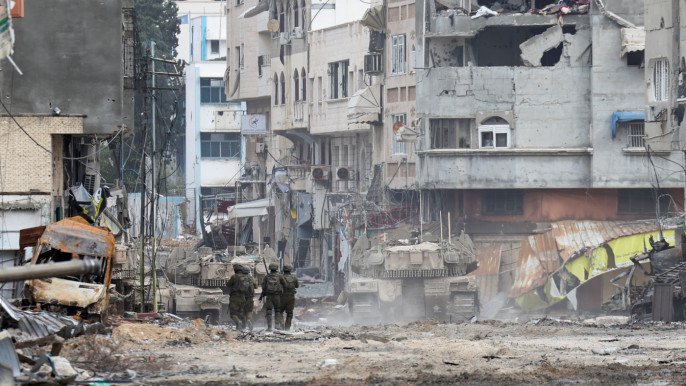Israel and Hamas had agreed early on Wednesday to a ceasefire in Gaza for at least four days, to let in humanitarian aid and free at least 50 hostages held by Hamas in the enclave in exchange for at least 150 Palestinians jailed in Israel
World News: Israeli soldiers and tanks operate, amid the ongoing ground operation of the Israeli army against Palestinian Islamist group Hamas, in the northern Gaza Strip, November 22, 2023. REUTERS/Ronen Zvulun
The release of hostages under a temporary truce between Israel and Palestinian Hamas will not happen before Friday (24 November), Israel’s national security adviser said, thwarting hopes of relatives that some would be freed on Thursday.
Israel and Hamas had agreed early on Wednesday to a ceasefire in Gaza for at least four days, to let in humanitarian aid and free at least 50 hostages held by Hamas in the enclave in exchange for at least 150 Palestinians jailed in Israel.
The starting time of the truce and release of hostages captured by Hamas during its Oct. 7 attack on Israel had yet to be officially announced. An Egyptian security source said mediators sought a start time of 10 a.m. on Thursday.
The Business Standard Google News Keep updated, follow The Business Standard’s Google news channel
“The negotiations on the release of our hostages are advancing and continuing constantly,” Israeli National Security Adviser Tzachi Hanegbi said in a statement released by the prime minister’s office.
“The start of the release will take place according to the original agreement between the sides, and not before Friday,” it said.
Israel’s public broadcaster Kan, citing an unidentified Israeli official, reported there was a 24-hour delay because the agreement was not signed by Hamas and mediator Qatar. The official said they were optimistic the agreement would be carried out when it was signed.
“No one said there would be a release tomorrow except the media … We had to make it clear that no release is planned before Friday, because of the uncertainty that hostages’ families are facing,” Kan quoted a source in Israeli Prime Minister Benjamin Netanyahu’s office as saying.
Since the Hamas attack on southern Israel that surprised the government and shocked Israelis, five hostages have been recovered alive. Israel says 1,200 people were killed, mostly civilians and about 240 hostages of different nationalities taken hostage by Islamist gunmen.
In retaliation, Israel has subjected Hamas-ruled Gaza to a siege and relentless bombardment. More than 14,000 Gazans have been killed, around 40% of them children, according to medical officials in the territory.
RED CROSS CAN VISIT HOSTAGES, SAYS NETANYAHU
Netanyahu made no mention of a potential delay in implementation of the agreement during a press conference late on Wednesday. Hanegbi’s statement was released about an hour after the press conference.
The Red Cross will be able to visit any remaining hostages in Gaza, Netanyahu said.
“We need to know they are alive, if they’re okay. It’s the minimum,” said Gilad Korngold, who drew just a measure of comfort from the deal between Israel and Hamas and was among those who was still awaiting word of relatives. Seven of his family members, including his 3-year-old granddaughter, were taken hostage.
“I want everybody back. But I think – and it’s a very tough decision – but I think the children and women must be (first). they’re most fragile. You know, they need to get out.”
The United States also hoped that aid would begin reaching Gaza in large volumes within the next few days, White House national security spokesperson John Kirby said.
The 50 hostages would be released over four days at a rate of at least 10 daily, Netanyahu’s office said. The truce could be extended day by day as long as an additional 10 hostages were freed per day, it said.
Israel’s justice ministry published a list of 300 names of Palestinian prisoners who could be freed.
Hamas said the initial 50 hostages would be released in exchange for 150 Palestinian women and children imprisoned in Israel. Hundreds of trucks of humanitarian, medical and fuel supplies would enter Gaza, while Israel would halt all air sorties over southern Gaza and maintain a daily six-hour daytime no-fly window in the north, Hamas said.
The truce agreement, the first in a nearly seven-week-long war, was reached after mediation by Qatar and seen by governments around the world as potentially easing the suffering of civilians in the Gaza Strip.
Gaza is the “most dangerous place in the world to be a child,” Catherine Russell, head of the United Nations children’s agency UNICEF, told the U.N. Security Council on Wednesday. More than 5,300 Palestinian children had reportedly been killed since Oct. 7, Russell said.
“The true cost of this latest war in Palestine and Israel will be measured in children’s lives – those lost to the violence and those forever changed by it. Without an end to the fighting and full humanitarian access, the cost will continue to grow exponentially,” Russell said.

